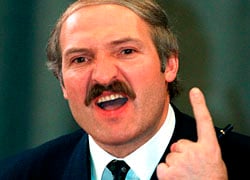«Reporters Without Borders»: Lukashenko — predator of press freedom
3- 3.05.2012, 14:21

On the very doorstep of the European Union, Lukashenko is doing all he can to re-assert control over the country.
With a woeful record stretching back to his accession to the leadership in 1994, he moved to a new level with the harsh repression of protests after his “re-election” in December 2010. Between then and December 2011, about 100 journalists were arrested, many beaten up and 30 or so sentenced to prison terms of varying lengths.
Freedom of expression and assembly were so restricted that protesters were only able to clap hands to express their discontent when they gathered in the main towns and cities. Even those resorting to this last-ditch form of popular expression were violently dispersed.
House searches, arrests and trials in Minsk and elsewhere have increased. Natalia Radzina, editor of the opposition website Charter97.org, was forced to flee abroad. Irina Khalip, correspondent of the independent Russian paper Novaya Gazeta, was released from prison in late January 2011 but kept under house arrest.
Independent national newspapers are collapsing under the weight of fines imposed on them, while the print runs of some regional title are regularly seized. The government is exacting vengeance for sanctions imposed by the European Union on its own citizens. For example, independent journalists, members of the opposition and human rights activists were alarmed to discover that they were no longer allowed to leave the country.
The surprising areas of freedom that have remained over the past 20 years have now been sharply reduced. Selective granting of accreditation forces many foreign media outlets and their local correspondents to work illegally, making them even more vulnerable. The Internet cannot make up for this lack of freedom, since cybercafé users and shared-line phone subscribers have since 2010 been identified and monitored, and website content subject to prior approval and monitoring by an “analysis centre” directly attached to the president’s office. On the very doorstep of the European Union, Lukashenko is doing all he can to re-assert control over the country. But activists are resisting and biding their time.










